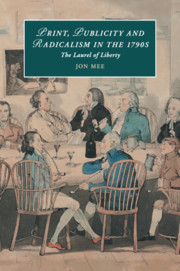Book contents
- Print, Publicity, and Popular Radicalism in the 1790s
- Cambridge Studies in Romanticism
- Print, Publicity, and Popular Radicalism in the 1790s
- Copyright page
- Dedication
- Contents
- Illustrations
- Acknowledgements
- Note on references
- Abbreviations
- Introduction: the open theatre of the world?
- Part I Publicity, print, and association
- Part II Radical personalities
- Notes
- Bibliography
- Index
- Cambridge Studies in Romanticism
- References
Bibliography
Published online by Cambridge University Press: 05 May 2016
- Print, Publicity, and Popular Radicalism in the 1790s
- Cambridge Studies in Romanticism
- Print, Publicity, and Popular Radicalism in the 1790s
- Copyright page
- Dedication
- Contents
- Illustrations
- Acknowledgements
- Note on references
- Abbreviations
- Introduction: the open theatre of the world?
- Part I Publicity, print, and association
- Part II Radical personalities
- Notes
- Bibliography
- Index
- Cambridge Studies in Romanticism
- References
- Type
- Chapter
- Information
- Print, Publicity, and Popular Radicalism in the 1790sThe Laurel of Liberty, pp. 236 - 260Publisher: Cambridge University PressPrint publication year: 2016
- Creative Commons
- This content is Open Access and distributed under the terms of the Creative Commons Attribution licence CC-BY-NC 4.0 https://creativecommons.org/cclicenses/

